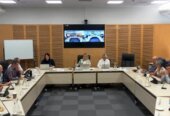
Te Awamutu Lyceum Club acting president Loral Piggott, centre, with visiting steampunkers Paula McWha and Barbara Preece.
Members of the Te Awamutu Lyceum Club were caught up in the fast-growing steampunk movement last week when two of Pirongia’s ‘Time Travelling Trio’ were guests at their lunch gathering.
Paula McWha and Barbara Preece wore their topic, so to speak. Both were clad in the steampunk style recognised internationally as one that draws on Victoriana and the Industrial Revolution, with touches of sci-fi and post-apocalyptic times thrown in.
Introduced by the club’s acting president Loral Piggott, Paula and Barbara said the movement is gaining momentum, both here and abroad. Steampunk is popular with both men and women, they said, with members taking on different ‘steampunk personas’ and enjoying slipping in and out of different personalities as they did so.
“Quite often we find that if we meet them out and about in normal wear, we don’t recognise them,” said Barbara. “It’s fascinating to watch as people grow in confidence. Most people make their own gear and we all become avid collectors of bits and pieces from here and there.”
Paula said steampunkers comprised males and females of all ages. Social media messages bring them together at various events. “It is all about imagination and fantasy … the craftwork involved can be as radical or as subtle as each individual wants.”
Loral said it had been one of the more unusual visits the club had enjoyed.
Like many others, the club is struggling with falling membership. There are 22 members, she said, and when she joined in the early 2000s, there were 110.
“It is partly due to natural attrition, which all clubs are facing, as well as competition with the many service clubs in the area and an increasing number of grandparents who are tied up looking after their grandchildren,” she said.
“Lyceum isn’t a service club. It has an educational and cultural focus; it was started among business and professional women, and in some places, like Melbourne for example, there are so many people applying that they have to turn them away.”
The International Association of Lyceum Clubs was a women’s club founded in London in 1904 by Constance Smedley as a place for women involved with literature, journalism, art, science and medicine. It was intended to be the women’s equivalent of men’s professional clubs of the day.
Clubs have since spread around the world. Members meet regularly and listen to a range of speakers. They also have ‘circles’ where they focus on gardening, music, books and writing.
“One of the greatest benefits in towns like ours is the social benefits members enjoy. There isn’t a fundraising element, so people are free to just come and enjoy what we have to offer,” said Loral.
Those keen to know more can contact Loral Piggott on 07-870 3097.








